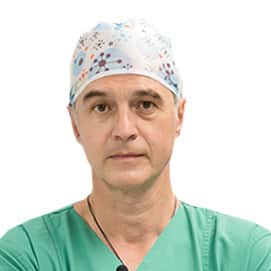The Clinic for General, Visceral and Minimally Invasive Surgery presents the full spectrum of surgery at a high level, which is typical for a hospital with maximum medical care for patients.
Along with the traditional specialization of colorectal and endocrine surgery (intestinal and thyroid surgery), the clinic also focuses on minimally invasive surgery (the so-called "keyhole surgery") and oncological surgery (surgery of malignant tumors).
The tasks of the clinic also include the treatment of seriously ill patients with an increased risk factor for surgical complications. In order to ensure the greatest safety and in cases where resuscitation is necessary, additional intensive care units under the guidance of anesthesiologists and intensive care units (Intermediate Care Station) have been created for such patients.
Minimally Invasive Surgery
The use of a sparing minimally invasive surgical method contributes to a faster recovery of the patient after surgery, a decrease in postoperative pain and a reduction in the length of stay in the hospital. In addition to all these advantages, thanks to this operative technique, an excellent cosmetic effect is achieved. The method of minimally invasive surgery is already traditionally used in operations to remove the gallbladder or inguinal hernia and operations for gastroesophageal reflux disease (heartburn). It is also used regularly for such major surgical interventions as partial removal of the stomach, intestines, esophagus, adrenal glands, rectum. The clinic is actively involved in the continuous development and improvement of minimally invasive surgical technologies. In addition to expanding the range of indications for major operations, the clinic's specialists are working on the possibility of permanently reducing incisions during frequent surgical interventions in order to further accelerate the process of patient rehabilitation and improve cosmetic results. Thus, at the beginning of 2009, the clinic began to use surgical interventions using the Single-Port method. This is the latest minimally invasive technique that allows you to remove the gallbladder through a very small incision in the navel, which is barely visible after the wound has healed.
In the field of general surgery, inguinal and umbilical hernia surgeries and operations for painful heartburn are increasingly taking place, which are mainly performed using minimally invasive technology.
Cancer surgery
It is a traditional part of the vast field of visceral surgery. The clinic offers the full range of oncological surgery using the most modern surgical methods and treats tumors of the entire gastrointestinal tract from the esophagus to the rectum, pancreatic tumors, as well as liver tumors and metastases. In the field of oncological surgery, minimally invasive techniques are also increasingly used (for example, in cases of malignant tumors of the intestine, rectum and esophagus). In addition to the use of all modern surgical techniques, interdisciplinary cooperation is a decisive factor for the effective treatment of patients, especially in this area. All modern forms of therapy are carried out in the clinic, on the basis of which, and also according to the latest scientific achievements, an interdisciplinary team of specialists develops an individual treatment concept for each cancer patient.
Colorectal surgery
Colorectal surgery (intestine and rectum) treats all benign and malignant tumors, and more and more operations are performed using the method of minimally invasive surgery. The range of surgical interventions includes inflammation of the intestine (eg diverticulitis), chronic inflammatory bowel disease (Crohn's disease, ulcerative colitis), pelvic floor dysfunction and cancers of the colon and rectum. The purpose of accelerating the postoperative rehabilitation of the patient is not only the minimally invasive surgical technique, but also the Fast Track technique, which has been used for several years. This is a modern, multifunctional therapy concept that reduces the number of common postoperative complications. This rehabilitation technique also helps to reduce the time of the patient's stay in the hospital.
Endocrine surgery
Here we are talking about the treatment of benign and malignant diseases of the thyroid and parathyroid glands, adrenal glands and pancreas. Operations on the parathyroid gland and on the thyroid gland are performed with constant monitoring of the nerves of the vocal cords through monitoring observation (neuromonitoring).
Head of the Clinic for General, Visceral and Minimally Invasive Surgery
Head of the Clinic for General, Visceral, Thoracic and Endocrine Surgery
Video
Request appointment
Useful links
Photo gallery










